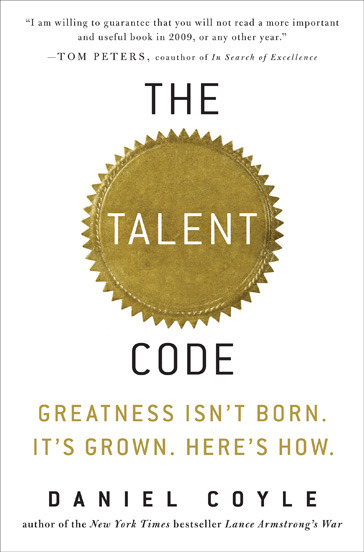I'm a big fan of Dan Coyle's book The Talent Code. He describes the fascinating methods some of the most talented athletes, performers, and business people use to grow their skills. I've been thinking about his book for months and how it applies to building writing talent. He has a section in the book that mentions writing talent (as evidenced by the Bronte sisters) but I wanted more. We were lucky enough to have him give an engaging talk at Pixar today. The talk inspired me to get my thoughts down about how Dan's principles of building talent apply to writing and specifically to writers groups.
Talent Hotbed
Dan talks about unique areas called "talent hotbeds" - places like Brazil (soccer), Spartak Academy (tennis), and Meadowmount (classical music). We have a mini talent hotbed here at Pixar - our writers group. This is a picture of a few of our members:
Laura runs our group - that's her holding the Austin Film Festival's Enderby Entertainment Award. She was one of 10 writers out of 6,764 who won this prestigious competition. That's the top 0.15%. That's awesome. But what's incredible is that Susan (on the right) was a Finalist this year (top 0.74%). And I (on the left) was a Finalist in 2012 (top 0.77%). We've had one other Austin Finalist from our tiny writers group (Stephan). Our group ranges between 4-8 core members who meet regularly. That means that half of our writers have made the Finals of one of the most prestigious screenplay competitions in the world. This isn't a coincidence - the odds are astronomical. So what's happening in our writers group to grow this talent?
Feedback Loops
Dan made a great point today that Pixar wasn't built out of glass and steel and our swimming pool. It's a place built on feedback loops. That's ingrained in our culture of "plussing" and the mantra of "fail early, fail often." We make 8-9 bad versions of our movies in reel form before we put the finished film out to the public. And all employees are invited to the screenings to give feedback to the producer. So we're constantly failing, iterating, and improving over the course of the 4-5 years it takes to make our films.
We've carried those feedback loops into our writer's group. Writers bring in pages every week and guess what - they're not pretty. I've contributed plenty of terrible pages over the years. Wooden dialogue, sagging second act, unsympathetic characters, etc. But we know that our group is a safe place to bring these bad pages. We do a table read (so you can hear your cringe-worthy dialogue out loud) and then we give feedback to the writer. "Have you thought about this?" "What if you...?" "What are you trying to achieve with this scene?" It's painful to hear this feedback. But the writers suck it up and learn to look at the work more objectively. Then they come in the next week with slightly better pages. The other great thing about giving feedback on others' scripts is that it lets you spot the problems in yours. By noticing when something isn't working over there you notice that you're having the same problem here. One of the worst screenwriting teachers I ever had would just tell everyone that everything they wrote was wonderful. That's no way to grow.
Windshield
Another concept Dan has is "what's in your windshield?" What are you looking ahead to? Who are you looking up to? We're spoiled here at Pixar because we get amazing filmmaking guests through here regularly. People like Quentin Tarantino, Darren Aronofsky, Jon Favreau, Michael Arndt, Alexander Payne, Lindsay Doran, and Thomas McCarthy. Sometimes they'll even come talk to our little writers group. This gives us concrete inspiration - someone to aspire to be. Within Pixar we have so many talented writer/directors that we look up to. And we also look up to and challenge each other. Seeing your fellow writers place highly in contests motivates you to work hard to also place. That's exactly what's happened.
Toggle Space
Dan talked about "toggle space", which is the area between a group being too nice and too mean. I may be butchering this concept but that's what I remember about it. It's basically an oscillation between contention and connection. We have contention in our writers group in that we tell each other what we think is wrong with the scripts. Feelings can get hurt but people are passionate about making the work better so we know it's coming from a genuine place. There's not a lot of gray area in our discussions - people speak their minds. Newcomers often have a hard time adjusting because we dispense with the standard "compliment sandwich" approach to feedback and go straight for the meat. It's faster and more effective to just get to the notes instead of dancing around them.
But that contention is tempered with connection. We support each other and root for each other. We go to screenwriting retreats and festivals together, where we drink and bond. We meet up for meals and celebrate each other's achievements with cupcakes and champagne. We tell each other about interesting writing-related events coming up. We are a community. So when you get that tough feedback you know it's coming from a place of love and support.
The Edge of Talent
Dan talks about finding the edge of your talent - that uncomfortable place where you're struggling but growing. In our writers group, we throw ourselves into new genres and formats. Seeing Laura tackle a historical period piece motivated me to attempt my first adaptation of a mythological cycle. Even when someone tends to stick to a certain genre they will usually set a challenge with the structure (recurring timelines, multiple protagonists, etc.) This means that we often fail (especially in the early attempts), but it ensures the work never grows stale and that we are constantly learning. Our group has grown and sought new challenges outside of screenwriting, from children's book writing to directing a narrative short to directing a feature documentary. We've built a habit of putting ourselves in uncomfortable places and trying new things.
Conclusion
Writing can be such a solitary activity. But a very effective way to build writing talent is to join or form a writers group. You get so many benefits, from feedback to community to inspiration. If you want to accelerate your writing growth, I recommend two things:
1) Buy Dan's book.
2) Join or start a writers' group.


